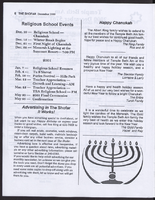Search the Special Collections and Archives Portal
Search Results

Transcript of interview with Roberta Kane by Barbara Tabach, September 6, 2017 and May 22, 2018
Date
Archival Collection
Description
Roberta “Bobbie” Kane (1932 - ) is the first known Jewish child born in Las Vegas. Her parents, Sallie and Mike Gordon, were liquor stores owners and among the founders of the first Jewish congregation in Las Vegas. Bobbie’s childhood remembrances are as a young girl who was fully aware that “Friday nights were reserved for religious services. Saturdays were always reserved for gin rummy.” In the late 1940s, as a teenager at Las Vegas High School (and 1950 graduate), Bobbie recalls Las Vegas as a small town and a joyful place to grow up. She briefly attended University of Southern California before marrying and beginning her family. In time, life brought her back to live with her parents. She pursued a career working for the Desert Inn group of hotels and helped open the Stardust in 1957. She was mentored by Mark Swain, “a six foot-four hunk of a cowboy” who worked for Moe Dalitz. This experience included driving Mark’s pink Cadillac to pick up hotel guests. This provided her with a
Text

Transcript of interview with Velma Holland by Beatrice Scheid, April 6, 1976
Date
Archival Collection
Description
On April 6, 1976, collector Beatrice Scheid interviewed housewife Velma Holland (born October 17th, 1903 in New Market, Iowa) in her home in Boulder City, Nevada. This interview covers her early life in Boulder City. Mrs. Holland, Connie Degennes, and Beatrice Scheid are present during the interview.
Text

Transcript of interview with Herb Tobman by Deborah Fischer, March 13, 1981
Date
Archival Collection
Description
Interview with Herb Tobman by Deborah Fischer on March 13, 1981. In this interview on the subject of gambling, Herb Tobman talks about moving to Las Vegas while working for Standard Oil as a tire, battery and accessory salesman, then began working for the Moulin Rouge as the general manager in 1955. He gives a description of the hotels on Las Vegas Boulevard and downtown, and the "western" nature of town where people rode horses. Tobman then discusses the types of gambling that were popular: slot machines, blackjack and craps. He also talks about the accommodations (hotels and motels) available in the 1950s, transportation to and from the area, entertainment, and the economy. The interviewer continually asks Tobman to compare 1950s Las Vegas with 1980s Las Vegas in terms of the gambling environment.
Text

Transcript of interview with Colleen Gregory by Tim Waters, April 6 & 7, 1976
Date
Archival Collection
Description
On April 6 and 7, 1976, Tim Waters interviewed Colleen Gregory (born 1928 in Santa Clara, Utah) about her life in Southern Nevada. Gregory first talks about her original move to Las Vegas, her early education, school activities, and her college education. She also talks about the first banks, Helldorado, the atomic testing, and environmental changes. Other topics covered include Howard Hughes, Western-style influences, first properties on the Strip, World War II, racial prejudice, and changes she has noticed during her career in banking.
Text

Transcript of interview with Leander Fields Hayes by Mark Kevin Ryhlick, March 13, 1981
Date
Archival Collection
Description
On March 13, 1981, collector Mark Kevin Ryhlick interviewed local technician, Leeander Fields Hayes (born on May 23rd, 1907 in Salt Lake City, Utah) in his home in Las Vegas, Nevada. This interview covers the history of entertainment in Las Vegas from the mid-forties to 1958. Brother Hayes, as he requests the collector to call him, specifically covers the local live music and comedy scenes. He also touches on the topic of segregation and how Black entertainers, such as Lena Horne, were treated when they came to perform in Las Vegas, Nevada.
Text

Transcript of interview with Stella Fleming by Suzanne Wright, February 24, 1979
Date
Archival Collection
Description
On February 24, 1979, Suzanne Wright interviewed Stella Fleming (born December 1, 1897 in Victoria, Canada) about her experiences as a Las Vegas, Nevada resident and as a worker in the welfare department in Clark County. Fleming first talks about some of her work in welfare and specifically the early practices of the welfare administration. She also discusses her work as it related to the Works Progress Administration, the American Red Cross, and the Nevada Emergency Relief Program. Fleming also provided some anecdotes about her experiences in that field before moving on to discuss some of the historical aspects of Las Vegas, such as the atomic testing, specific landmarks and locations, and the development of the city.
Text

Transcript of interview with Mary Habbart by Jane Finfrock, February 28, 1979
Date
Archival Collection
Description
On February 28, 1979, Jane Finfrock interviewed Mary Habbart (born 1897 in Boothwyn, Pennsylvania) about her life in Southern Nevada. Habbart first talks about her move to Las Vegas in 1920 and her husband’s subsequent employment. She also talks about the first casinos, the development of the university campus, visits of U.S. presidents, and the Mormon Fort. She also discusses the Helldorado Parade, flash floods, snowing in Las Vegas, her role in developing Sunset Park, her family, and her education.
Text

Rosamond McDougal interview, February 14, 1979: transcript
Date
Archival Collection
Description
On February 14, 1979, Concepcion Fernandez interviewed Rosamond McDougal (born in Texas) about her life as a teacher in Las Vegas. McDougal speaks primarily about her time as a teacher in the Clark County School District, her unique class setup and the district’s changes. Moreover, McDougal speaks about the growing number of students and teachers, the superintendent’s role in bond issues, the courses offered, racial integration in the school district (and the casinos), and the building of the University of Nevada, Las Vegas. McDougal gives personal anecdotes about her family, her husband’s job at the Atomic Test Site and her time as an organ player in churches around the city. Lastly, she talks about recreational activities, Helldorado, the casinos and department stores.
Text

Interview with Cecil C. Garland, July 19, 2006
Date
Archival Collection
Description
Text

